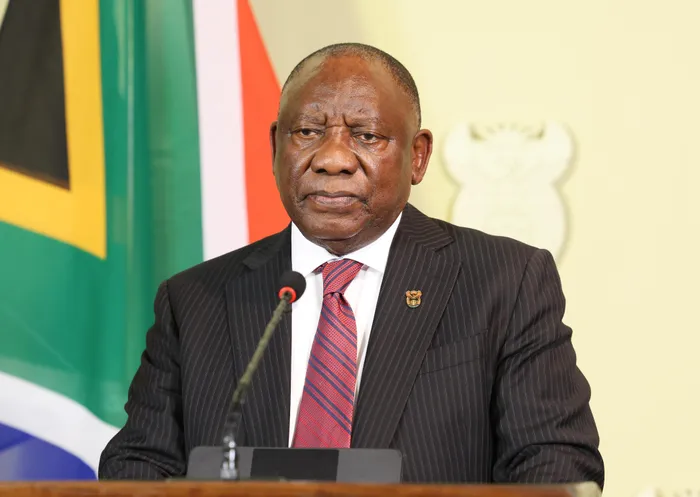Is Ramaphosa’s appointment of an Acting Police Minister unconstitutional?

Expert claims Ramaphosa's appointment of acting Police Minister violates the Constitution.
Image: Supplied/GCIS
President Cyril Ramaphosa’s appointment of an acting police minister, alongside Police Minister Senzo Mchunu being placed on special leave, could be a case of executive overstepping, a constitutional law expert believes.
Mchunu has been placed on special leave amid explosive allegations against him by KwaZulu-Natal police commissioner Lieutenant General Nhlanhla Mkhwanazi, but the question of the legality of the president appointing an acting police minister from outside the Cabinet, while there was no vacancy, has arisen.
Political parties such as the Democratic Alliance (DA) and the Economic Freedom Fighters (EFF) have questioned the legality of Ramaphosa’s decision, which was made public on Sunday night.
Ramaphosa also announced a judicial commission of inquiry led by Acting Deputy Chief Justice Madlanga would be established to investigate the damning claims of infiltration in the criminal justice system by underworld players with ties to drug cartels.
Ramaphosa also announced that he appointed Professor Firoz Cachalia as acting Minister of Police, effective from August 1, 2025.
"This is a direct violation of Section 98 of the Constitution, which states: 'The president may assign to a Minister any power or function of another Minister who is absent or otherwise unable to fulfil the functions of office," the EFF said in a statement.
"The president's decision is therefore not just unlawful, but a deliberate abuse of the supreme law of the land."
The DA criticised the delayed decision to place Minister Senzo Mchunu on leave. "These allegations strike at the heart of South Africa's criminal justice system, implicating senior law enforcement, prosecutorial, intelligence, and even executive officials in organised crime and systemic corruption," the party said.
IOL spoke with three experts - two legal experts and a political analyst to find out their views about the president's decision.
Speaking about the appointment of Cachalia, Dr Tumi Mmusinyane, who is a North West University (NWU) law professor with an in-depth knowledge of constitutional law pointed out that the president, as head of the Executive Branch, has the ability to make appointments that are authorised by the Constitution or any legislative body.
"The Constitution does not enable him to appoint an outsider into the cabinet as an acting Minister because such is not catered for...That constitutes an executive overstepping and an overreach of his constitutional powers, which then hinges on the principle of legality," Mmusinyane said.
As the head of the Cabinet, Ramaphosa has the executive authority to select Ministers under Section 91(2) of the Constitution.
Mmusinyane added that Section 91(3) is prescriptive in terms of who the president can appoint, but it is silent on the appointment of acting ministers. However, section 91(3)(c) states that the President may pick no more than two Ministers from outside the National Assembly.
"Section 98 empowers the president in the context of "may" to assign any power or function to another cabinet member who is absent from office or is unable to exercise that power or perform that function. If we look at these two sections, they are referring to the Presidential powers to appoint a Minister and assign to another cabinet member a function and enable him to appoint a minister outside his cabinet.
"While the Constitution only refers to the appointment of Ministers and assignment to another cabinet ministerial position, it does not say anything if the same powers and assignments can also be extended to an acting minister," he said.
Mmusinyane went on to say: "The Constitution does not enable him to appoint an outsider into the cabinet as an acting Minister because such is not catered for... That constitutes an executive overstepping, an overreach of his constitutional powers, which then hinges on the principle of legality.
Mmusinyane added that Ramaphosa must be challenged.
"He will need to be challenged through a review of his executive authority decision, and that is where he will be expected to provide reasons for going outside the cabinet to appoint an acting minister by the Constitution, which does not make provision for it."
Political analyst Siyabonga Ntombela explained that the president could not have appointed the deputy ministers as they are not members of the cabinet.
"They cannot act on that executive position. They have their duties that they need to attend to. Historically, Ministers have been temporarily appointed to act on behalf of their contemporaries," said Ntombela.
Casting a different Willie Spies from Hurter Spies, attorneys said the President may also appoint ministers without or with portfolios. "The Constitution empowers him to do that. I therefore believe that his actions are constitutionally sound," said Spies.
IOL Politics